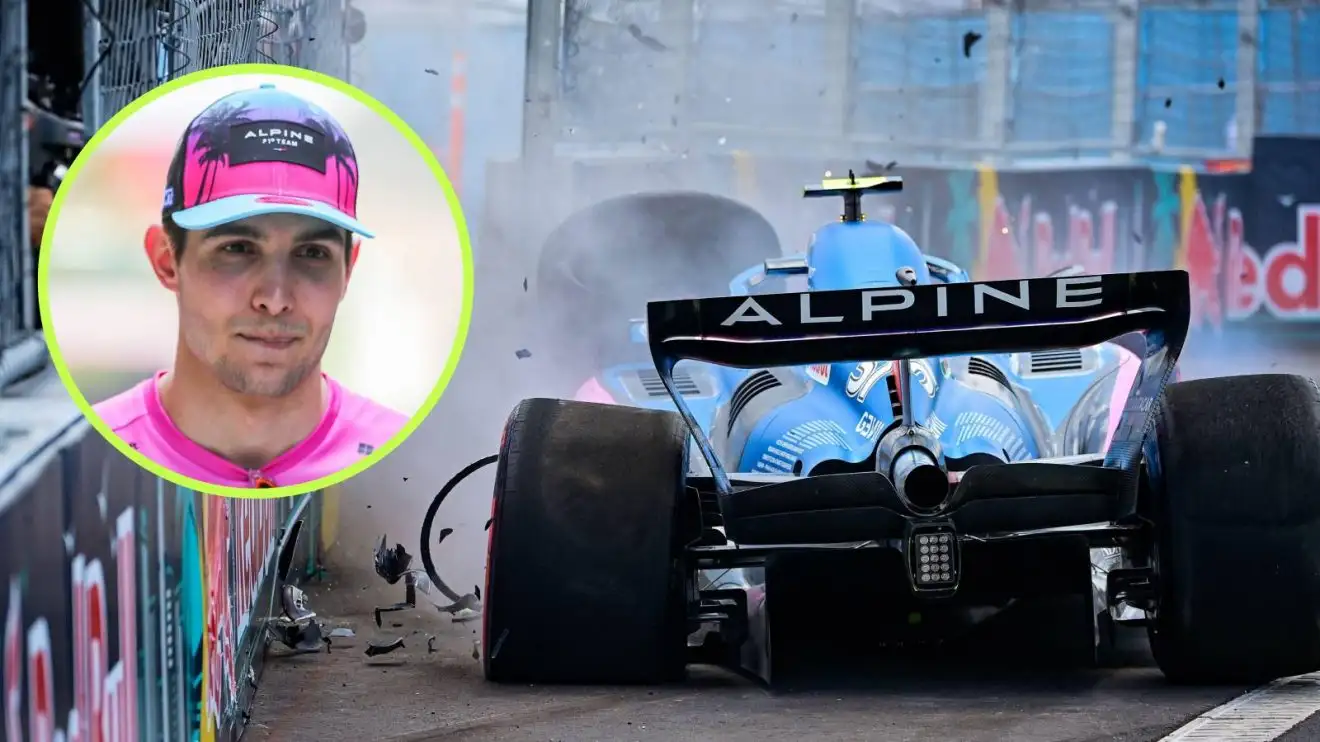Esteban Ocon ‘collapsed in the shower’ following 51G Miami crash

Esteban Ocon has revealed he "collapsed in the shower" after his Miami 2022 crash.
Esteban Ocon has revealed that an apparently innocuous crash three years ago resulted in him “collapsing in the shower” shortly afterward.
The French driver offered an alarming version of events following his crash in practice for the inaugural Miami Grand Prix in 2022.
Esteban Ocon was ‘peeing red’ after Miami GP crash
The now-Haas F1 driver has revealed that his crash at the Miami International Autodrome in 2022 left him reeling, despite being an incident he labelled as “not that impressive”.
Ocon was racing for Alpine that year, and lost control of his car as he approached Turn 14 during FP3. With no tyre barriers lining the circuit at that point, he slammed sideways into the concrete wall and sustained serious damage to his A522.
At the time, Ocon revealed the impact had been 51G in terms of the forces registered, with his seat being shattered into pieces as well as the pedal box being destroyed. He didn’t take part in qualifying, but went on to race from the back to finish eighth and score some points.
Three and a half years later, he has now revealed that his physical condition may have been worse than he thought at the time, having been cleared to race.
“I’ve had some big crashes,” Ocon said on the Legend YouTube channel in an interview with Guillaume Pley.
“Touch wood, those crashes have never been too violent, despite some of them exceeding 40G and some that really stunned me. Sometimes my eyesight got blurry, or I had a headache for three, four days…
“I took 42G (sic).
“For people who want to see that crash, it’s not that impressive, but I hit a concrete wall. That was in Miami, in FP3, in 2022. I went off, I hit the wall. I hit both my knees and could barely walk afterwards.”
More analysis from PlanetF1.com:
👉 F1 uncovered: Hidden details revealed under the lights in Singapore
👉 Russell to stay? Predicting the next move for every out-of-contract F1 driver
A stunned Ocon did take around 90 seconds to clamber out of his car, and said he felt poorly the day afterward, just hours before taking part in the Grand Prix.
“I remember, the next morning, I was in the shower and I collapsed. I lost my balance and fell. I was not well at all. I managed, starting from last, to finish eighth in that race. I was peeing red, that was not great!”
Ocon’s reveal of his after-effects could suggest that his racing in a Grand Prix just a few hours after losing his balance in the shower may not have been optimal for either his own health or the safety of those around him on track.
Under the regulations defined by Article 2.2.1.a of the International Sporting Code in 2022, while the chief medical officer or FIA medical delegate could request a check-up at any time over a Grand Prix weekend, the driver is primarily “responsible for informing the Chief Medical Officer and the doctor in charge of the series or championship of any health problems (unless entirely benign) without delay”.
This year, the FIA published information on how drivers are assessed based on potential issues. Ocon’s issues after his Miami crash are not defined in medical terms, but could be related to musculoskeletal, which the guidelines say, “drivers should demonstrate satisfactory range and strength of neck and limb movement, stability of joints likely to be subjected to prolonged or sudden stress, and the absence of pain likely to lead to subtle incapacity.”
For potential head injuries, assessment is made based on various categories of severity. With no suggestion of Ocon having lost consciousness, his injuries could have been assessed under the two mildest categories, if applicable.
“Minimal head injury is defined as any concussive symptoms lasting less than 48 hours, no loss of consciousness, no post-traumatic amnesia, focal neurological deficit or seizure,” it states.
“Minimal head injury is compatible with medical fitness to compete once recovery has taken place.”
“Mild head injury is defined as any concussion lasting over 48 hours,” it continues.
“A period of up to 6 weeks off competing may be required. Drivers may not be considered fit until fully assessed on recovery without symptoms with appropriate reports.”
Read Next: Why David Coulthard’s £2.5million crash in 1995 wasn’t entirely his own fault





